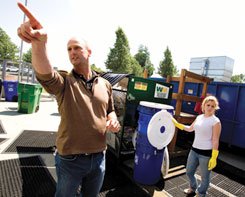How to Reduce Your School’s Eco-Footprint
Follow these tips for making your school more environmentally friendly.
Your content has been saved!
Go to My Saved Content.
This how-to article accompanies the feature "Reading, Writing, Recycling: One Oregon School Is Making the Planet a Better Place."
Rod Shroufe, founder of Clackamas High School's sustainable-systems class, says making your school more eco-friendly is just a matter of taking the initiative. He offers these tips:
Assess your current facility. First off, ask the right questions, says Shroufe: "What is our capacity here? What do we have control of? What don't we have control of? Make a checklist -- this might include recycling, energy use, pesticide and chemical use, indoor air quality, food waste, water efficiency, and so on.
Ask yourself: 'Do I have any control over the immediate building site and its energy use? If so, what can I do about it? Does my school recycle? How much? Do I have any control over school grounds?' Start by figuring out what is there, what is not there, and what is in your capacity to change."
Make sure everyone understands the goal. No schoolwide movement is possible without schoolwide buy-in. All students and staff need to acknowledge and comprehend the problem, the solution, and its importance. Clackamas's recycling program began with students educating other students and staff about the value of recycling and their goals for the program through ten-minute presentations in each classroom.
They also created bulletin boards illustrating the process of, and reasons for, recycling and put them in all the common areas, and continually displayed student-created PowerPoint presentations on television screens stationed around the school. "That educational piece has got to come first," Shroufe says.
Promote the idea with schoolwide events. You can further the educational component by initiating schoolwide challenges, such as "No-Waste Lunch Day," during which students and staff attempt to throw as little as possible into the trash at the end of the lunch period. (Often, two-thirds of the contents of a bag of garbage could have been reused or recycled.) Try initiating a schoolwide reuse competition, too, with prizes for the student or classroom that brings in the most refillable ink cartridges or recyclable cans (a recent success at Clackamas).
Get funding. "Start out soliciting money that is local," Shroufe suggests, "because those people can get to know you and your program. Once you get that initial funding, it becomes easier and easier to get more." Grants for Shroufe's projects come from nearby organizations such as the Clackamas County Recycling Partnership, Portland's Metro (a government body that offers environmental protection-related grants), and the Meyer Memorial Trust.
Also, attend green conferences, such as the Earth Club conference, hosted by the Northwest Earth Institute. The people who are trying to educate the general public about the environment are often willing to fund environmental education and other environmentally conscious initiatives, and these gatherings are great networking devices.
You can also raise a good deal of money by simply being eco-friendly: Recycling ink cartridges, bottles, cans, and consumer electronics, for instance, can earn plenty of cash for your projects (check out EcoPhones or TonerInx, companies dedicated to collecting electronic waste -- and handing out hefty refunds).
Form partnerships with nonprofits and community service clubs. SOLV, an environmental nonprofit organization in Hillsboro, Oregon, turned out to be a perfect fit for Shroufe and his students. Organizations such as SOLV have projects already up and running and resources at their disposal (for example, saplings, shovels, and other equipment). Through connecting with these kinds of organizations, you can extend the reach of your own program, and both groups can benefit from each others' resources.
Tapping into nationally recognized clubs that require community-service hours for membership, such as Key Club International or the National Honors Society, encourages involvement of a larger and more diverse group of students. Also, good relations with local companies in general can help you acquire materials -- the first recycling bins at Clackamas, for instance, were discarded syrup barrels from a nearby Coca-Cola distribution center.
Take it one step at a time. The most valuable piece of advice Rod Shroufe has for those who are interested in growing more environmentally conscious: Don't try to save the world all at once. "One year, when I was trying to clean up my daily behaviors, I decided to start using cloth napkins in the house," he says. "Now, that's part of the routine."
"What next?" Shroufe adds. "You can do the same thing at the school level. Say you wanted to reduce the number of aluminum cans that go into the trash at your school by 50 percent. How would you do that? What would it entail? Figure out the details, do it for a year, and then move on to the next project."
Sara Bernard is a former staff writer and multimedia producer for Edutopia.
Related Green Articles:
From Trash to Treasure:
Reusing industrial materials for classroom art projects.Green Cleaning:
Harmful products can bite the dust.